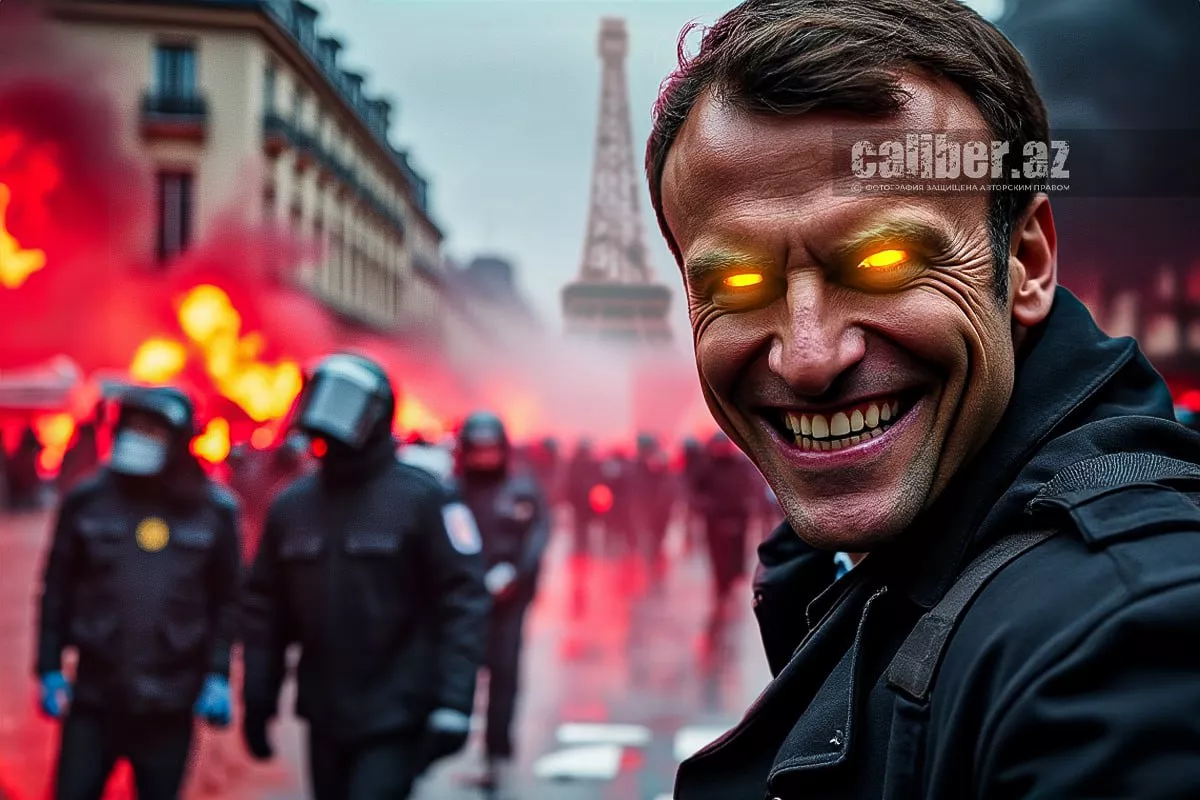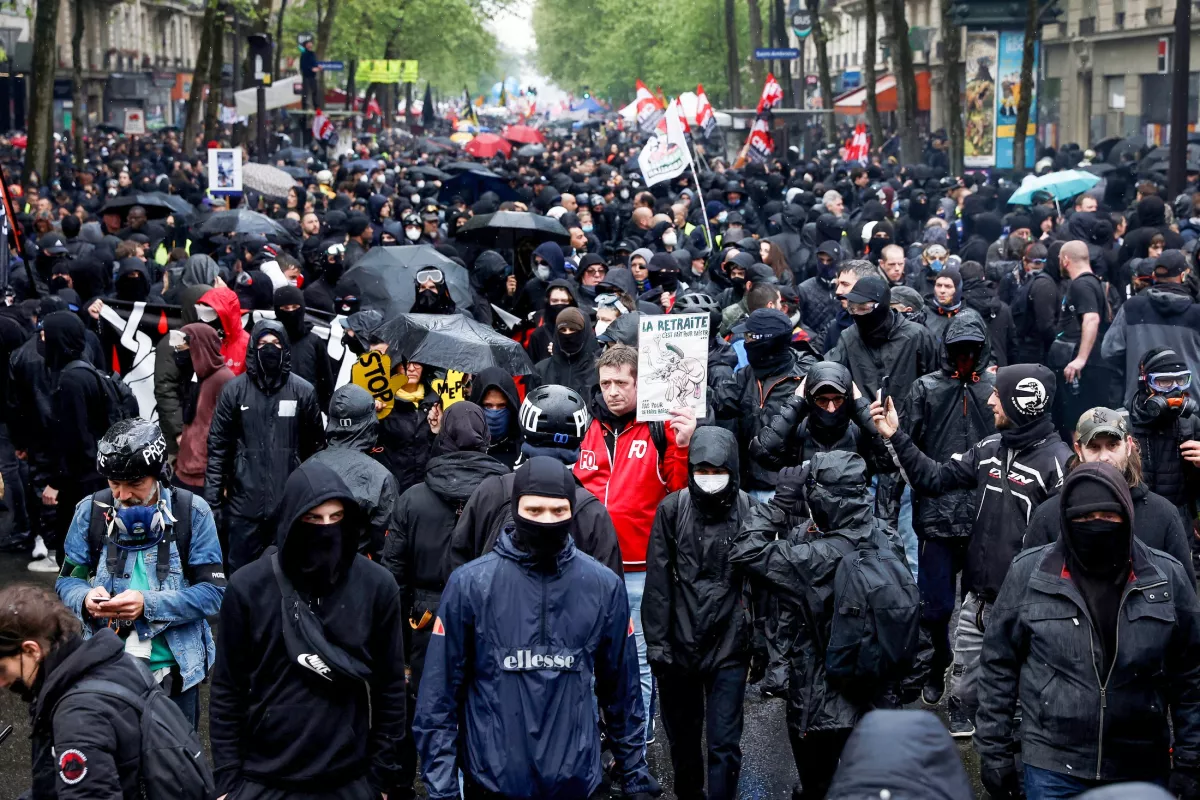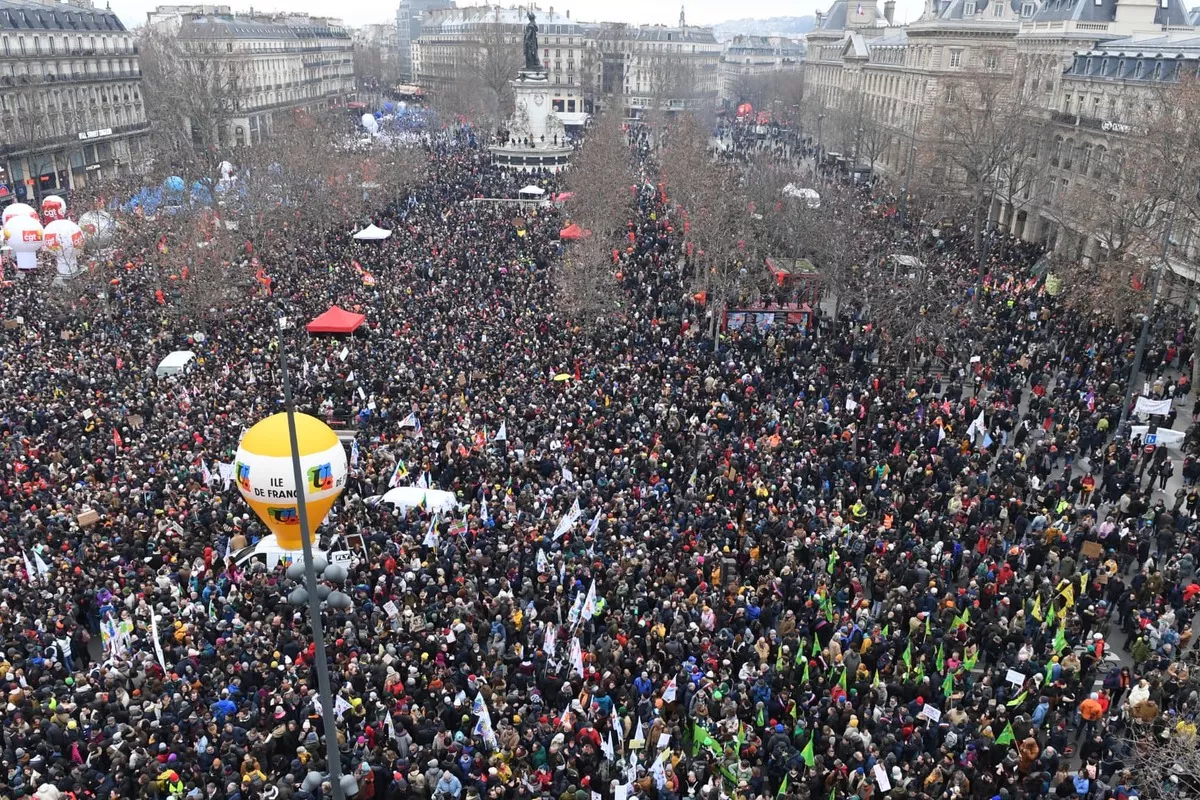Disappointment with Macron France faces growing political violence
The number of people who took to the streets of French cities on May 1st this year was significantly higher than in 2024. As expected, tensions ran high during several street protests.
May: When labour and peace are at risk
According to French police, the May Day demonstrations in solidarity with workers gathered 157,000 people this year, with 32,000 in the capital. The General Confederation of Labour (CGT) reports 300,000 protesters, and according to union sources, 100,000 of them were in Paris alone. In any case, there is a notable increase in the scale of street protests, with the police reporting 121,000 participants across the country last year.

On International Workers' Day, the General Confederation of Labour (CGT), the United Federation of Trade Unions, "Solidarity," the French Democratic Confederation of Labour (CFDT), the National Union of Autonomous Unions (UNSA) and other syndicates, left-wing parties, and youth movements called on their supporters to take to the streets.
The main reason for the rise in protest sentiments is the growing socio-economic crisis in France. One of the most pressing issues that has struck the French people is unemployment. In the last quarter of 2024, the number of registered unemployed increased by 3.9%, the largest increase since 2008. In the first quarter of 2025, unemployment grew by 8.7%, or 237,000 people. Today, in France (excluding Mayotte), 3.4 million people are without work. Prices are rising, and the housing problem remains acute, with rent continuing to increase. Consequently, the number of homeless people, including children, is also on the rise.
This year, many French citizens also joined the May 1st rallies out of concern for global peace and the threat of a major war in Europe. France is undergoing intensified militarisation and is attempting to compensate for its loss of post-colonial influence in Africa through aggressive interference in the affairs of independent states — including in the South Caucasus.
Trade unions have voiced frustration that workers' concerns about social issues are increasingly drowned out by government rhetoric on rearmament and employers’ demands to tighten belts and work even harder. The CGT called on the French people to take to the streets on May 1st under the slogans: “Against the far-right, for peace, freedom, and social justice.”
In addition to Paris, demonstrations were held in Marseille (15,000 participants), Toulouse (10,000), Strasbourg, Brest, Rennes, Bordeaux, Nancy, Narbonne, Metz, and Dunkirk. In total, rallies and mobilisations took place in 270 towns and cities across France.
In the port city of Dunkirk, home to one of the largest blast furnaces in Europe, workers protested against the planned layoff of 600 employees at the steel company ArcelorMittal. Mass layoffs have also been announced at Jennyfer, STMicroelectronics, and other corporations. The march in Dunkirk was particularly striking — leading it was a steelworker dressed in a silvery suit, balaclava, and protective gear against molten metal splashes, waving a smoke flare to the sound of “The Internationale.” Banners at the front of the march called for the nationalisation of the company, with slogans like “We can pour metal without Mittal.” This year’s May Day demonstration in Dunkirk gathered over a thousand participants — three times more than usual, according to union representatives. It seems that the hardships of life are increasingly pushing French workers to stand up for their rights.
In Tours, protests targeted the announced layoff of 1,000 workers by STMicroelectronics. In Metz, 113 job cuts are also planned. “We’re fed up with those who sell off hospitals to buy Rafale fighter jets,” chanted protesters there. In Dijon, where Tetra Pak is preparing to cut 207 jobs, the CGT declared: “We must work less so that everyone can work. Work should be shared, just like wealth.”
In Rennes, more than 3,000 people marched through the Villejean district, where a shooting occurred at a Subway restaurant two weeks ago. This was the unions’ way of expressing solidarity with local residents and protesting against drug trafficking.
The “Black Bloc” escalates the confrontation
Notably, the May Day demonstration in Paris took on a festive, almost carnival-like atmosphere at times. Among the protesters were “rabbits,” clowns, and even a performer dressed as Jesus. Brass bands played alongside rap artists. Demonstrators carried signs and chanted slogans demanding the reversal of the pension age hike, wage increases, and proper funding for hospitals and schools. A key demand this year was also a moratorium on layoffs.
However, alongside the peaceful marches organised by trade unions and left-wing parties, radical activists dressed in black and wearing masks—known as the “Black Bloc”—joined in. They attacked several sites they deemed “symbols of capitalist oppression” and clashed with police. Such incidents, while serious, are not uncommon during demonstrations in France.

What came as a surprise this time was something else — the people in black turned on demonstrators from the Socialist Party (PS). The radicals, chanting slogans like “Everyone hates the Socialist Party,” attacked PS members, including elected officials. According to Chloé Ridel, a Member of the European Parliament from the Socialist Party, the assailants punched and kicked the socialists, insulted and spat on them, threw firecrackers, and tore down their flags and banners. One party member was dragged across the ground and nearly lynched. Four PS activists, including one MP, sustained minor injuries. The party’s platform was also destroyed.
The PS’s own security personnel defended members from the “Black Bloc” until police arrived and prevented further escalation. “Shame on those who claim to be part of the people and join a Labour Day march only to attack other activists,” Ridel stated.
And this was already the second instance of aggression against the Socialists in recent days. On Sunday, April 27, during a rally against Islamophobia, a group of people dressed in black began shouting slogans against the Socialist Party — some of which were perceived by participants as antisemitic: “Genocide perpetrators,” “Dirty Zionists,” “Traitors.” As a result, Socialist Party MP Jérôme Guedj was forced to leave the rally. During the May Day demonstration in Paris, Guedj was targeted again — on Boulevard de l’Hôpital, he was insulted and pelted with fireworks as he passed by a group from the anarcho-syndicalist organisation CNT. The mobile gendarmerie eventually intervened, arresting two individuals.
Socialist Party leader Olivier Faure announced that official complaints had already been filed: “We will never accept the violence of fanatics who serve no purpose and undermine the collective struggle.” The incident was also condemned by union leadership. Interior Minister Bruno Retailleau wrote on X: “We will not back down in the face of political violence that the far left is trying to impose on our country.” However, the minister — a conservative known for his hardline stance on immigration — failed to mention that in this case, it was fellow leftists who were the victims of the “far-left” violence.
Violent clashes with police broke out in Nantes, where 5,000 people took to the streets on May 1. Police used water cannons to disperse the crowd, while protesters threw stones and Molotov cocktails at officers and damaged the local prefecture building.
During the May Day demonstrations, French police arrested 72 people, 28 of whom were taken into custody. In Paris alone, 52 protesters were detained, including one individual involved in the attack on Socialist Party activists. Fifteen arrests were made in Nantes. Six police officers sustained injuries.
Who is behind the attacks on socialists? Sometimes the "black bloc" is referred to as police provocateurs, but this time a representative of the Socialist Party called them "agents" of the far-right "National Rally." However, in the videos, flags that once belonged to the "black bloc" are visible – from the "Antifa" movement, anarcho-syndicalists from the CNT, and a banner with Arabic inscriptions. Recently, Socialist Party deputies have been increasingly accused of a compromising stance on pension reform and of effectively supporting Macron and his government, which has provoked discontent and even anger among many radical leftists. In "La France Insoumise," socialists are blamed for the collapse of the "New Popular Front." However, Manuel Bompard, the coordinator of "La France Insoumise," distanced himself from acts of violence, saying: "We do not agree with resolving political disagreements in this way."
Of course, modern France is still far from the 1960s-1980s, with the terrorism of the far-right "Secret Army Organisation" (OAS) and the far-left "Action Directe." But today, politically motivated violence is growing before our eyes, and the systemic crisis that fuels it shows no signs of easing.

And the issue of unity among all progressive forces has once again become a pressing one in recent days. Even trade unions only manage to unite their efforts on May 1st. The leader of "La France Insoumise," Jean-Luc Mélenchon, is even accused of "disregarding union independence" and "politicising May 1st." In response to the criticism, Mélenchon stated: "For a long time, it was the trade unions that united May Day and the working class worldwide. Unfortunately, today such unity is impossible. Therefore, politicians must do their part and say: 'If you want to change labour, you need to change the world.'" At the same time, the frontman of "La France Insoumise" supports some quite radical demands – for example, to nationalise the company ArcelorMittal, which is laying off its workers.
The positions of some union leaders may be more loyal to the interests of big capital.
A major success for labour in France
The far-right was only able to hold one major "national" May Day rally. International Workers' Day is clearly not their day. At the rally in Narbonne, Marine Le Pen, leader of the "National Rally," again spoke about mass migration, claiming that it leads to wage reductions and "undermines social stability." She also stated that by denying her the opportunity to run for president, the authorities had "stolen democracy."
By the way, in Paris on May 1st, another event took place – over a thousand people gathered to honour the memory of Aboubacar Cissé, who was killed last week in a mosque in the Gar region. "Racism kills, no hatred for Muslims," read the banners held by protesters, who gathered at the call of SOS Racisme and activist Assa Traoré.
Jean-Luc Mélenchon, ahead of the May Day demonstration in Paris, said: "For us, May 1st is an anti-racist rally, and racists of all times, all eras, have always known this." According to the leader of "La France Insoumise," racism and Islamophobia were "invented by the powerful of the world to divide people."
According to the General Secretary of the French Confederation of Labour (CGT), Sophie Binet, this year's May Day demonstrations were a major success. The unions are not planning to stop there. On May 13th, the CGT is calling on all civil servants to protest against cuts to public services. On this day, the General Confederation of Labour intends to mobilise its activists for a demonstration during the meeting of the EU Social Security Production Council (CSE) in Paris. The fight against layoffs in large corporations will also continue. A nationwide demonstration against raising the pension age and for job preservation is scheduled for June 5th. On this day, the French Communist Party will present a resolution in Parliament calling for the repeal of the pension reform. If necessary, protesters threaten to block the Tour de France, the 3rd stage of which is scheduled for July 7th between Valenciennes and Dunkirk, a city where mass layoffs of steelworkers are planned.
This summer in France promises to be heated in every sense. Such is the outcome of French society's disappointment with Macron's governance...








